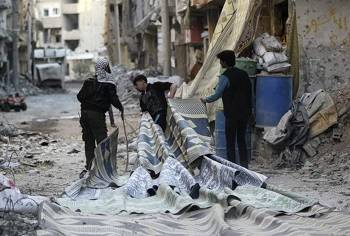Russia and China have vetoed a UN Security Council resolution backed by Western powers that would have imposed sanctions on Syria over the alleged use of chemical weapons by the government of President Bashar al-Assad.
Drafted by Britain, France and the United States, the measure on Tuesday won nine votes in favour, while three countries - China, Russia and Bolivia - opposed it.
Kazakhstan, Ethiopia and Egypt abstained.
It was Russia's seven veto in five years to save its Syrian ally. China, also one of the five veto-wielding permanent members of the Security Council, has joined Russia in vetoing six resolutions on Syria.
The resolution would have put 11 Syrians, mainly military commanders, and 10 entities linked to chemical attacks in 2014 and 2015 on a UN sanctions blacklist.
Russian President Vladimir Putin had warned that imposing sanctions on Syria during the ongoing Geneva conference was "completely inappropriate" and would undermine the effort to end Syria's nearly six-year war.
Russian Deputy Ambassador Vladimir Safronkov echoed Putin's view that imposing sanctions would have undermined peace talks and described the draft resolution as a "provocation" by the Western "troika".
'Sad day'
The proposal marked the first major Security Council action by the new US administration under President Donald Trump, which is seeking warmer ties with Russia.
"This resolution is very appropriate," US Ambassador to the UN Nikki Haley told the Council after the measure was defeated in the vote.
"It is a sad day on the Security Council when members start making excuses for other member states killing their own people."
"The world is definitely a more dangerous place," she said, criticizing the vetoes as "abominable and indefensible choices".
Commenting on Haley's choice of words, Marwan Bishara, Al Jazeera's senior political analyst, pointed out that one could not differentiate between the US ambassador under ex-President Barack Obama and the current US envoy to the UN under the Trump administration.
"In Washington, they don't know what's their policy in the Middle East," he said, adding that the US strategy in the region was not articulated.
"At the end of the day, everyone is reflecting their own core geopolitical calculus."
For his part, Safronkov described the statements made against Moscow in the Security Council as "outrageous".
"Today's clash or confrontation is not a result of our negative vote. It is a result of the fact that you decided on provocation while you knew well ahead of time our position," said Safronkov.
The proposed resolution followed a UN-led investigation which concluded in October that the Syrian air force had dropped chlorine barrel bombs from helicopters on three opposition-held villages in 2014 and 2015.
The joint panel of the United Nations and the Organization for the Prohibition of Chemical Weapons (OPCW) also found that Islamic State of Iraq and the Levant (ISIL) fighters used mustard gas in an attack in 2015.
Russia and China also blocked in 2014 a request for the International Criminal Court to open up investigations of war crimes committed during the war in Syria.
The Syrian regime has repeatedly denied using chemical weapons in the war that has killed nearly 400,000 people and displaced almost half the country's population since 2011.
PHOTO CAPTION
Free Syrian Army fighters pull carpets along a rubble-filled street as they prepare to use them as curtains to provide cover from snipers loyal to Bashar al-Assad in Deir al-Zor, eastern Syria February 11, 2014. REUTERS
Al-Jazeera


 Home
Home Discover Islam
Discover Islam Quran Recitations
Quran Recitations Lectures
Lectures
 Fatwa
Fatwa Articles
Articles Fiqh
Fiqh E-Books
E-Books Boys & Girls
Boys & Girls  Articles
Articles










